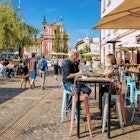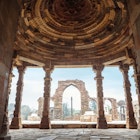
Everything you should see and do on a trip to Warsaw

Oct 31, 2019 • 7 min read

Explore Warsaw's amazing architecture. Krystian Pawlowski / 500px
With the Foster + Partner designed 310m Varso Tower set to be completed in 2020, Warsaw is on track to displace London as home to the tallest building in the European Union. Closer to the ground, a youthful energy is also transforming this 700-year-old survivor into an ideal location for a central European city break.

A respect for history
Eighty years ago Nazi Germany aimed to wipe Warsaw from the face of the earth – a goal that was very nearly achieved by the end of WWII. However, Varsovians are nothing if not tenacious, and out of the rubble and ashes it is miraculous what has survived – some of which is now preserved in the city’s top museums.
Start in the Old Town, itself a remarkable reconstruction of how this part of Warsaw looked in the 17th and 18th centuries. Here, the innovative Museum of Warsaw displays thousands of eclectic objects, each illuminating different aspects of the city’s history. The museum has several other branches scattered around the Old Town that are worth searching out as well as the equally impressive Praga Museum of Warsaw over on Warsaw’s east side across the Vistula River.
Next, deep dive into the city’s darkest days at the exceptional Warsaw Rising Museum. Housed in a former tram power station, this museum forensically covers the heroic but doomed uprising against the German occupation in 1944 via an immersive range of interactive displays, including archival films and personal accounts.
Also leaving practically no stone unturned on a millennium of Jewish life in Poland is the award-winning POLIN Museum of the History of Polish Jews. The multimedia permanent exhibition shows how much Jewish culture enriched Poland, before Europe's largest Jewish community was practically annihilated during WWII. The museum’s stunning contemporary building, designed by Finnish architectural firm Lahdelma & Mahlamäk, is a sight in its own right and stands amid a park at the heart of the former Jewish ghetto.

Amazing architecture
From medieval churches and revamped art nouveau market halls such as Hala Koszyki, to a flying saucer shaped former railway ticket office that’s now a cafe, Warsaw puts on quite the architectural show. Many of the city's most historic buildings, including the Royal Castle, are restorations or total recreations, but they are no less impressive for that.

During the Communist era socialist realist style went off the scale for the Marszałkowska Residential District (MDM) with its chiselled heroic worker reliefs and giant pair of candelabra on Plac Konstytucji, as well as the monolithic Palace of Culture & Science, a 1950s 'gift' from the USSR to Poland. To see some of the vast complex’s grand interior architecture, join the guided tour offered by Creatours whose booth is next to the ticket office for the observation terrace.
In recent years trendy café/bar/theatre and gallery Studio Teatrgaleria has spearheaded a cultural project to make better use of part of the somewhat forlorn Plac Defilad that surrounds the complex. Between May and August, in front of the Palace's main eastern entrance, events such as film screenings and concerts are mounted. In winter rent ice skates and work your way around the ice rink that is set up in front of the northern entrance.
Other noteworthy contemporary buildings include the Copernicus Science Centre, a fun and hugely popular interactive learning experience; and Warsaw University Library, with monumental copper panels on its facade symbolising the pages of books. In summer the library also offers a rooftop garden from which to relax and take in the views.
The great outdoors
Since 2014 Warsaw has run an architecture award; the 2018 winner was the Vistulan Boulevards, an imaginatively landscaped promenade that has refocussed attention on the river that splits the city. On the Vistula’s east bank footpaths lead through riverside woods to Rusałka Beach, a favourite spot for Varsovians to relax and work on their tans in the warmer months – and one of several beaches along the river.

The former royal hunting ground of Łazienki Park has been transformed over the centuries to include themed gardens, palaces, an ornamental lake and an amphitheatre. It’s home to the Chopin Monument, a fabulous art nouveau bronze statue beside which free piano recitals by award-winning musicians are held every Sunday between mid-May and September.
Another pleasure for nature lovers is the 45-hectare Wilanów Park surrounding Wilanów Palace, 12km southeast of the city centre. Baroque Italian gardens, a Renaissance-inspired rose garden and an English-style landscape park are all part of Wilanów’s design. Even in winter the park is still worth visiting as it is transformed nightly by coloured illuminations.
Art and design
While out at Wilanów don’t miss the Poster Museum in the palace’s renovated stable block. Polish poster designers have gained international acclaim for their original works: some wonderful examples are displayed in the regularly changing exhibitions here, and you can buy classic images in its shop. Back in the city centre, Galeria Plakatu Polskiego has the best selection of original and reproduction posters for sale.
Several centuries of outstanding Polish art and design are on display at the National Museum. The eye-popping collection here covers everything from Medieval religious icons to dazzling decorative arts. The museum’s Polish Design Gallery displays iconic pieces such as Ćmielów porcelain, 1960s fabric prints and Teresa Kruszewska's 1973 'Tulip' armchair;
Art is not restricted to galleries in Warsaw – it can be found in the form of giant Communist era mosaics that decorated the side of the buildings, as well as the contemporary counterpart of painted murals. The old industrial buildings and tenements of Praga, in particular, have become a favoured canvas for street artists, thanks to events such as Street Art Doping. Preserving another Varsovian art form is the Neon Museum, a vibrant retirement home for iconic communist-era neon signs.
The Museum of Modern Art is also doing its bit to make sure art has a profile outside of formal gallery walls. While the institution awaits its permanent home to be built on the north side of Plac Defilad, it has a temporary exhibition space at the Museum on the Vistula: the exterior of this pavilion is covered by 1600 sq m work by Sławomir Pawszak, Poland's largest painting. Another of the museum’s projects is Bródno Sculpture Park, which brings to Warsaw’s north eastern suburbs contemporary works by the likes of Paweł Althamer, Youssouf Dara and Olafur Eliasson.

Eat, drink and be merry
Having fed your mind and soul with the best of Warsaw it’s now time to feed your stomach. Whatever your budget you won’t be disappointed. Milk bars (bar mleczny) are super cheap, self-service canteens that are a hangover from communist times. These serve hearty Polish food, mainly vegetarian or dairy-based, hence the name. The best of these operations, such as Prasowy, have given their proletarian decor a contemporary makeover.
If you’re in town on a weekend get over to Hala Gwardii. This 1902 art nouveau market hall once hosted boxing matches; it’s back to selling food and drink, though now in the shape of hipster street-food outlets, craft beer bars and third wave coffee kiosks.
If you’d prefer a traditional style Polish restaurant, romantic Dom Polski in chic Saska Kępa is a great example. For something more contemporary, and to experience local chefs working at the top of their game, book ahead for Bez Gwiazdek or Zoni both of which offer menus that provide give historical and regional Polish recipes a modern twist.
Zoni is part of Koneser, a multiple use complex that’s the latest chapter in the hip revamp of Praga. Top brands of Polish vodka were once produced in the handsome red brick buildings here, as you’ll discover at the interactive Polish Vodka Museum. Take the tour here and you learn all you need to know about the spirit – finishing up, of course, with a tasting of three types of vodka: na zdrowie (cheers)!
Produced by Lonely Planet for Warsaw Tourism. All editorial views are those of Lonely Planet alone and reflect our policy of editorial independence and impartiality.
Explore related stories




 Road TripsThe 7 best road trips in Arizona to discover ancient culture and modern wonders
Road TripsThe 7 best road trips in Arizona to discover ancient culture and modern wondersNov 8, 2024 • 6 min read

 BeachesCroatia itineraries: 3 routes to explore the cities, coasts and interior
BeachesCroatia itineraries: 3 routes to explore the cities, coasts and interiorNov 8, 2024 • 6 min read


 Tips & AdviceThe best things to eat in Montréal right now and where to find them
Tips & AdviceThe best things to eat in Montréal right now and where to find themNov 8, 2024 • 6 min read
